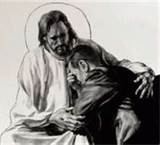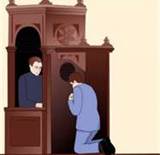Penance
There are five steps in the Sacrament of Reconciliation:
- Examination of our conscience
- Expressing our sorrowfulness. Being sorry for having broken the Laws of God
- Making a resolution against all sinful occasions.
- Confessing our sins to a priest.
- Receiving the forgiveness (absolution) and doing the penance the priest give you.
Sin hurts our relationship with God, ourselves and others. As the Catechism states:
The sinner wounds God’s honor and love, his own human dignity… and the spiritual well-being of the Church of which each Christian ought to be a living stone. To the eyes of faith, no evil is graver than sin and nothing has worse consequences for the sinners themselves, for the church, and for the whole world. (CCC 1487, 1488)
A mature understanding of sin includes reflecting upon our thoughts, actions and omissions as well as examining the patterns of sin that may arise in our lives. With contrite hearts, we are also called to reflect upon the effects of our sins upon the wider community and how we might participate in sinful systems.
Contrition and conversion lead us to seek a forgiveness for our sins so as to repair damaged relationships with God, self, and others. We believe that only ordained priests have the faculty of absolving sins from the authority of the Church in the name of Jesus Christ. (CCC1495) Our sins are forgiven by God, through the priest.
The Spiritual effects of the Sacraments of Reconciliation include:
- reconciliation with God by which the penitent recovers grace
- reconciliation with the Church
- remission of the eternal punishment incurred by mortal sins
- remission, at least in part, of temporal punishments resulting from sin
- peace and serenity of conscience, and spiritual consolation
- an increase of spiritual strength for the Christian battle (CCC 1496)
Individual confession with a priest is the principal means of absolution and reconciliation of grave sins within the Church. The Sacrament of Reconciliation frees us from sinful patterns of behavior and calls us to complete conversion to Christ. Reconciliation heals our sins and repairs our relationships.


